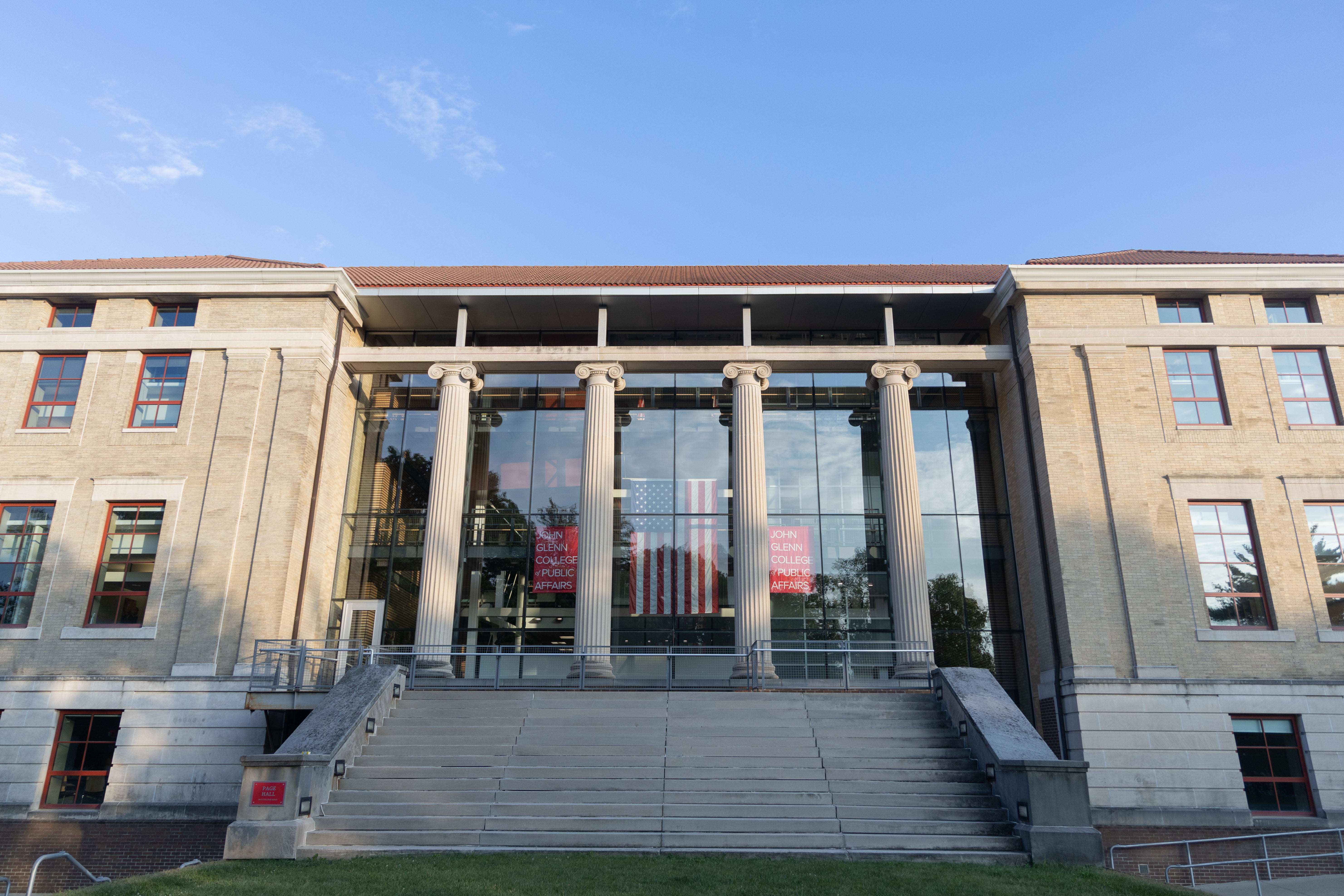
Ohio State’s John Glenn College of Public Affairs may be getting a brand new academic center, pending House approval, after the passing of Senate Bill 117 Jun 28. Credit: Caleb Blake | Photo Editor
A center for “intellectual diversity” may be established within Ohio State’s John Glenn College of Public Affairs under a bill currently being considered by the state’s House of Representatives.
Senate Bill 117, which proposes new educational centers in universities throughout Ohio, passed the Ohio Senate June 28 and awaits House consideration. The bill — sponsored by state Sens. Jerry Cirino and Rob McColley — would create the Salmon P. Chase Center on Ohio State’s campus if passed.
“Our interest is in promoting what we consider to be a broad understanding of the American political tradition, while at the same time emphasizing the importance of freedom of inquiry and a liberal [arts] education,” Cirino said.
According to the Ohio Senate’s website, Cirino said the bill is needed because he believes ideology is replacing the lessons of history on campus.
“And the less students learn about and embrace America’s founding principles and ideals, the more free speech is disappearing from our citadels of higher education and, subsequently, our entire nation,” Cirino continued in his commentary.
He said leftist ideology has a monopoly on most college campuses and is squashing intellectual diversity and punishing “wrong-think and anti-woke dogma”.
“But I do not believe the way to cure the leftists bias on campus is by foisting conservative ideology on academia,” Cirino said. “I believe the real fix is to ensure neutrality on the part of the instructors and administrators. Let all sides be heard. Let students decide for themselves what is true. Let free speech be preserved and protected. That is the American way. It should be taught in our universities again.”
Cirino said the center is an independent educational establishment from Ohio’s legislature, and Trevor Brown, dean of the John Glenn College, said Page Hall was recommended by the university as a potential location.
“The center will be an independent center housed in the [college]. Most academic centers at Ohio State do not have a stand-alone building,” Brown said in an email.
Christopher McKnight Nichols, a history professor at Ohio State and former director of the Humanities Center at Oregon State University, said he does not see the need for the Salmon P. Chase center due to the institutions in place at the university already achieving the presented goal of intellectual diversity.
“There’s already 70-plus centers and institutes at the university, a number of which are devoted to nonpartisan events and conversations and topics that include scholarly approaches to thoughtfully considering questions of civics,” Nichols said. “Some of the most obvious examples are the Center for Ethics and Human Values, which has its own civil discourse project.”
Maria De Rezende Grisi, a third-year Ph.D. student, said she is in opposition to the bill and development of the center as she believes intellectual diversity should occur organically rather than being put in place through legislation without a clear definition.
“It’s really hard for them to put intellectual diversity there and not specify what they mean,” De Rezende Grisi said.
De Rezende Grisi also questioned how Senate Bill 83, which is also sponsored by Cirino, could work in conjunction with this bill when they seem to have opposite goals.
“When you see [Senate Bill] 83 fighting against DEI programs, and then you see [Senate Bill] 117 talking about intellectual diversity, you think that it’s very contradictory in the roots of the thing,” De Rezende Grisi said. “How can you be against diversity, equity and inclusion in the university — in general, they don’t like this idea — but at the same time, you want to ensure intellectual diversity?”
Despite the independence of the center, there has been coordination with the university. Cirino said there have been discussions with lawyers at Ohio State and a 14-school association called the Inter-University Council of Ohio, of which Ohio State is a part.
The bill would also give the university $5 million each fiscal year to fund the center and its own faculty. This raised concern for Nichols, who said hiring is a major issue because Ohio State faculty go through a lengthy search process that involves disciplinary experts.
“This will result in people who are hired, quite possibly, who are seen by fellow faculty members as illegitimate,” Nichols said. “If they don’t go through the normal process, if they aren’t evaluated by their peers and if they’re doing the same kinds of jobs as other people who have gone through that process, they are simply unlikely to have the same level of respect.”
Ohio State is in compliance with the bill and is eager for the new curriculum it provides, Brown said.
“We are excited about the opportunity this legislation provides to create an academic center of the highest caliber and a national leader in teaching, research and engagement on U.S. civics, culture and society,” Brown said.


